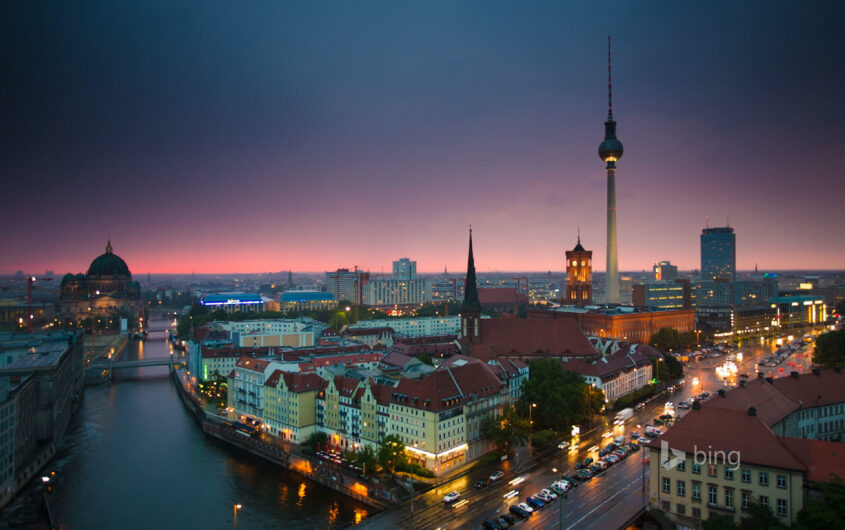
Szecska via Flickr
The Illusion of Effortless Prosperity

Wolfgang Reitzle
AGI Trustee
Dr. Wolfgang Reitzle is Chairman of the Supervisory Board of Continental AG and a member of various other supervisory boards. He is a Trustee of the American-German Institute.
This article originally appeared in German in Die WELT.
Germany is in decline. Not just since the COVID-19 pandemic and the Ukraine war—the relevant performance indicators have been trending negative for quite some time. Growing productivity used to be Germany’s hallmark, but unit labor costs have now been rising for many years. Germany is no longer among the top ten countries in Europe in gross domestic product per capita. It has also fallen off the list of the twenty most competitive countries in the world.
The sixteen-year chancellorship of Angela Merkel was too much, even for a country as economically strong as Germany. In the Merkel era, there was not a single structural reform to make the country more efficient. Two fundamental decisions of that period will have a lasting effect, however: the energy transition and the opening of the borders to uncontrolled migration. Energy became much more expensive. The culture of the country changed, and the social safety net came under pressure.
Merkel’s political style was situational and reactive—remaining behind the curve instead of implementing a strategic plan designed with the future in mind. Far too little has been invested in Germany’s future for almost twenty years now; it is the welfare state that has been continuously expanded. What suffered was Germany’s preventive maintenance: the rail system, roads, bridges, schools, and public facilities have suffered massively. For a country as rich as Germany, the condition of its infrastructure is a disgrace.
The poor services provided by the state to its citizens stand in stark contrast to the constantly increasing tax burden, due to excessive bureaucracy. And where the German bureaucracy leaves off, Brussels takes over. A company like BASF, for example, has to contend with 14,000 pages of directives and regulations for the chemical industry. Germany’s supply chain law and the forthcoming EU supply chain directive will massively increase the bureaucracy costs for companies, while at the same time the public administration has completely slept through digitalization.
Much of what Germany used to be admired for around the world no longer works. How could all this happen?
Over decades of prosperity, a new set of values has emerged. At its core is a belief in prosperity without exertion and a renunciation of the ideals of performance and accomplishment. Today, 25 percent of children completing primary school do not meet the basic requirements. Now even the tape measure and stopwatch will be banned from the National Youth Games for elementary school students. Too much pressure to perform! The massive decline in German students’ results in the international PISA study speaks volumes.
But how will Germany be able to hold its own in global competition over the next few years if performance is neither promoted nor rewarded? If higher earners are penalized with taxes while at the same time the country moves in the direction of an unconditional basic income, as it is doing with the new “citizens’ income?” A society that interprets justice as equality, and thus undermines any performance orientation, will lose out in a rapidly changing world characterized by technological upheaval.
We Have the Shortest Working Hours in the World
The logical consequence is that the state must increasingly become the insurer against personal life risks. But that is desperate overreach. The share of the state in overall economic output has now reached 50 percent. Reliance on the state is increasing, whereas support for the market economy is falling.
Germany already has by far the shortest work year in the world, at 1,349 hours annually, compared to 1,791 hours in the United States and 1,830 hours in Poland. Yet we are now discussing a four-day week, preferably with two days of remote work to improve work-life balance. We are stuck in stagflation, and we have a pressing shortage of skilled workers—we clearly have to work more instead of less.
In such a critical phase, in which all of the country’s relevant performance indicators are negative, politicians’ alarm bells should be ringing. But the alarm systems no longer work in Germany either, as we saw during the flash floods in the summer of 2021.
Why is there so little public discussion of these issues? Because the focus has long been on one issue alone: the climate. No country in the world pursues a climate policy as stupid as Germany’s, where the government seems to want to save the global climate almost single-handedly.
We need a quick correction of the ideological climate policy. It harms the country and does little or nothing to protect the climate.
In this pursuit, we have switched off perfectly functioning nuclear power plants at a time of glaring energy shortages. This foregone electricity will be replaced, in part, by nuclear power from France and coal-fired electricity from Germany. How credible is that? For a long time to come we will have the dirtiest electricity in Europe after Poland, and we will make no significant contribution to protecting the climate.
The fundamental flaw in German energy and climate policy lies in the maxim: “All Electric—Renewables Only.” Everything is to be electrified: cars, heating, industry. In short order, Germany’s electricity requirements would double, and the capacities for wind and solar power would have to increase fourfold. Since wind and solar power have high intermittency, we would need huge storage and reserve capacities. However, for a country like Germany, this is neither technically feasible nor affordable. It is simply lunacy.
Even before the Ukraine war, Germany’s electricity was among the most expensive in the world. The “Renewables Only” strategy makes it definitively unaffordable. When Vice Chancellor and Minister of Economics Robert Habeck says that electricity for industry must be subsidized for a few years until cheap wind and solar power is available nationwide, either he has entered the world of fairy tales, or he is deceiving the citizenry.
Wind and Solar Power are Volatile
Habeck’s plan for “Renewables Only” will fail. He and the Greens are on an ideological journey, accompanied by what can only be called a faith-based community of left-green journalists, which will bring Germany a gigantic decline in prosperity.
A different energy strategy would be wiser, with two pillars. The first pillar would be wind and solar power, capped at around 50 percent of supply. The second pillar ideally would be nuclear power, but that no longer seems to be feasible in Germany. The next-best option would be gas-fired power plants using carbon capture, in other words, CO₂-free.
With such a mix, the intermittency of renewables would be manageable. Most industrial processes could also be converted to gas with carbon capture—they would be CO₂-free at a much lower cost than the currently favored transition to green hydrogen. Instead, Habeck & Co. are pursuing dogmatic climate policies, detached from cost considerations, thereby ruining Germany’s industrial competitiveness.
German politics, with its abandonment of performance-based incentives, its aspiration for equality, and its pursuit of an irresponsible climate policy, is a danger.
From a green point of view, however, this is not a bug, but a feature. The real goal of green policies is the restructuring of society—a de-growth society is to take the place of growth-driven capitalism. This is the only way to bring about the desired behavioral change toward reduced consumption.
Placing the debate on a moral plane is very helpful for this restructuring of society, while the technical scrutiny of green beliefs is to be prevented. Even news reports by the public broadcasters increasingly engage in this sort of finger-wagging, directed not at the government, but mainly at the population.
If this trend continues, Germany will fall further behind. But that would be a problem for all of Europe. With the single European currency, a de facto liability and transfer union was created in which Germany is the insurer of last resort. If Germany were to become the sick man of Europe, its AAA rating would be at risk. The day Germany would lose this rating would be D-Day for the Euro system. After all, the Euro is the largest experiment in history for a single currency without a fiscal union and is therefore fragile.
Reason and the Market Economy
In this respect, German politics, with its abandonment of performance-based incentives, its aspiration for equality, and its pursuit of an irresponsible climate policy, is a danger. Not only for Germany, but for all of Europe. These ominous trends must be stopped. Germany needs a change in direction and a fact-based policy of rationality and market-based economics.
We need an effective immigration law that brings people into the labor market and not into the social welfare system. As long as uncontrolled migration continues, mass immigration is tolerated and repatriation does not work, the social system will encounter even greater difficulties. An open discussion about this is not desired.
The scarcity of affordable housing exacerbates this problem. The German government made a promise when it took office to create 400,000 new apartments every year, but this has already become unrealistic—another failure of the state. The emergence of no-go areas too. Right-wing governments are taking power in more and more European countries. If we continue like this, it will also become a real danger in Germany.
How will Germany be able to hold its own in global competition over the next few years if performance is neither promoted nor rewarded?
Our country still has unique strengths. We still have admirably strong small- and medium-sized enterprises (Mittelstand). We still have cutting-edge research, with beacons like the Technical University of Munich. We still have research institutions like the Max Planck, Leibniz, Helmholtz, and Fraunhofer Societies—a brilliant scientific landscape.
There is now an urgent need for a blunt appraisal and an acknowledgment that many mistakes have remained uncorrected for far too long. Above all, however, we need a new fundamental consensus in our society beyond the culture of work-life balance.
Prosperity without achievement is an illusion. Without prosperity there is no functioning welfare state. National wealth only grows in the soil of the market economy, not in a planned economy. We need a lean but efficient state. We need a school and education system that focuses on quality and standards. Above all, however, we need a quick correction of the ideological climate policy. It harms the country and does little or nothing to protect the climate.
But all of this is only possible with open debate, if Germany becomes a real marketplace of ideas again, in which discussions are tough but fair, instead of constantly getting lost in moralizing. And the country must rediscover a virtue that was lost somewhere between Agenda 2010 and today: ambition.









